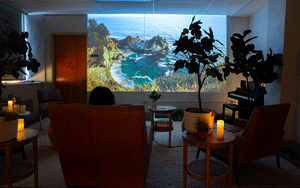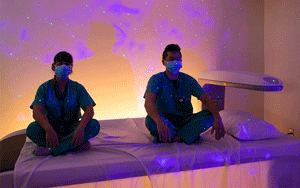 In March 2020, as the world grappled with the onset of the COVID-19 pandemic, the Abilities Research Center (ARC) at Mount Sinai took a proactive step to support health care workers across the Mount Sinai Health System. Anticipating the immense toll the pandemic would take on these front-line heroes, the ARC established recharge rooms—innovative spaces designed to provide a sanctuary for health care workers, offering them a much-needed respite from the relentless pressures of their work.
In March 2020, as the world grappled with the onset of the COVID-19 pandemic, the Abilities Research Center (ARC) at Mount Sinai took a proactive step to support health care workers across the Mount Sinai Health System. Anticipating the immense toll the pandemic would take on these front-line heroes, the ARC established recharge rooms—innovative spaces designed to provide a sanctuary for health care workers, offering them a much-needed respite from the relentless pressures of their work.
The founding principle of recharge rooms is rooted in the science showing that exposure to nature can profoundly benefit a person’s physical and mental health. To this end, the rooms offer voice-activated, immersive experiences that simulate natural environments such as oceans and rainforests. These settings are designed to address anxiety, stress, and trauma while improving cognitive performance.
The impact of recharge rooms has been nothing short of remarkable. During the initial surge of the pandemic, a survey of 495 front-line health care workers at The Mount Sinai Hospital revealed a 60 percent reduction in stress levels after using the rooms. This significant reduction in stress enabled the workers to continue their shifts with renewed hope and purpose, ultimately translating into better care for patients.
Since their inception, thousands of health care workers have benefited from the recharge rooms. The spaces were designed in collaboration with Studio Elsewhere, a company known for its creative and inclusive design framework. Studio Elsewhere’s team leads employee workshops to co-design experiences that consider cultural competency, ensuring that the rooms are inclusive and safe spaces for all users.
 The efficacy of the recharge rooms extends beyond anecdotal evidence. Under the leadership of David Putrino, PhD, Professor of Rehabilitation and Human Performance at the Icahn School of Medicine, and Director of Rehabilitation Innovation for the Mount Sinai Health System, a multidisciplinary team has been studying the effects of these environments on health care workers. Their research has shown that the rooms reduce perceived stress and lower physiological markers such as cortisol levels and galvanic skin response, a common indicator of stress and anxiety.
The efficacy of the recharge rooms extends beyond anecdotal evidence. Under the leadership of David Putrino, PhD, Professor of Rehabilitation and Human Performance at the Icahn School of Medicine, and Director of Rehabilitation Innovation for the Mount Sinai Health System, a multidisciplinary team has been studying the effects of these environments on health care workers. Their research has shown that the rooms reduce perceived stress and lower physiological markers such as cortisol levels and galvanic skin response, a common indicator of stress and anxiety.
Five years on, recharge rooms continue to demonstrate their value with ongoing studies showing no decrease in effectiveness over time or across variable scenarios. The success of recharge rooms has led to their expansion to 18 hospitals across the United States, where preliminary analysis of the results indicate that large reductions in perceived stress are still being experienced by users, validating the initial findings gathered during the height of the COVID pandemic and demonstrating their efficacy across different communities and scenarios.
The recharge rooms were established by a philanthropic gift from the Cullman family—long-standing, visionary supporters who have been an integral part of The Mount Sinai Hospital since its establishment as The Jews Hospital in 1852. A member of the Cullman family has served on the Board ever since. Currently, two Cullman siblings—Susan and Edgar, Jr.—serve on the Mount Sinai Health System Boards of Trustees and oversee the activities of the Cullman Institute.
The Cullman’s sustained commitment to Mount Sinai has been instrumental in recognizing the unique contributions of each individual—spanning doctors, nurses, coordinators, family caregivers, and more—to the patient experience. The recharge rooms embody that commitment to caring for our caregivers.
 Recharge rooms provide a sanctuary for health care workers and highlight the importance of creating environments that support mental health and well-being. As Dr. Putrino aptly puts it, “Environments are not neutral. They can harm or they can help. There is no limit to what we could be doing to create smart environments that aid in healing, enhance the patient experience, and improve the well-being of the people caring for our patients, as well”.
Recharge rooms provide a sanctuary for health care workers and highlight the importance of creating environments that support mental health and well-being. As Dr. Putrino aptly puts it, “Environments are not neutral. They can harm or they can help. There is no limit to what we could be doing to create smart environments that aid in healing, enhance the patient experience, and improve the well-being of the people caring for our patients, as well”.
Looking ahead, the next step is to extend the benefits of recharge rooms to patients. Plans are underway to introduce these therapeutic environments to neurological ICUs at Mount Sinai, to enhance the patient experience and aid in healing.
The story of the recharge rooms at Mount Sinai is a testament to the power of innovative thinking and compassionate care, setting a new standard for holistic well-being in the health care landscape.
 Health Care Workers Reflect on the Recharge Rooms
Health Care Workers Reflect on the Recharge Rooms
Ramona Gross, Assistant Director of Volunteer Services and Co-Lead of the Black Leaders Advocating for Change & Community Employee Resource Group at Mount Sinai West, shares her experience: “It’s such a wonderful space. The time that I spent there leaves me so relaxed and recharged and ready to finish my day. Everything from the aromatherapy, sounds, lighting, and visuals made it a moment for me to get away from it all and just really enjoy this quiet time. This is really truly amazing. There are no words”.
Shannon O’Neill, PhD, a psychologist at the Center for Advanced Circuit Therapeutics and Assistant Professor at the Icahn School of Medicine, reflects on the personal impact of the recharge rooms: “The recharge rooms were a way for me to escape. Separated from my family during the pandemic while I worked at the hospital, in the room I could pretend I was with them in my happy place, on the beach at our family home. Each feature of the room was incredibly thoughtful and intentionally customized, from the originally orchestrated music to the soothing scents and colorful hues. Experiencing the room offered me personal solitude, finding meaning and purpose in my work”.
